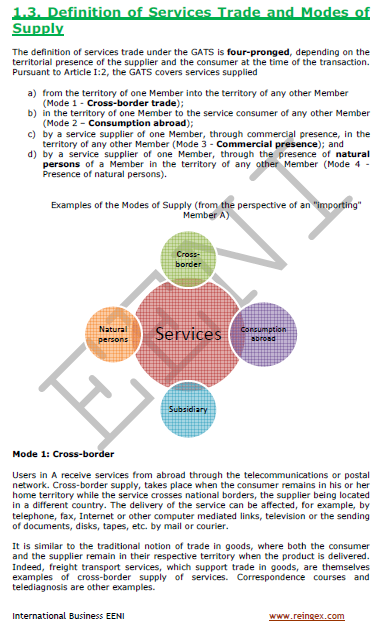World Trade Organization (OMC) Doha

General Agreement on Trade in Services (GATS), World Trade Organization. Global Trading System
- Introduction to the World Trade Organization (OMC)
- From the GATT to the WTO
- Doha Agenda
- Non-tariff Barriers
- Trade Facilitation
- Regionalism and the WTO
- Regional Trade Agreements
- Environment and the WTO
- Investments and the WTO
- E-commerce
- World International Trade Report
- International Trade Centre (ITC)

- General GATS
- Trade Facilitation Agreement
- Agreement on Sanitary Measures
- Agreement on Technical Barriers to Trade
- Agreement on Preshipment Inspection
- Agreement on Safeguards
- Agreement on Customs Valuation
- Agreement on Rules of Origin
- Tariffs
- Agriculture
- Standards and Safety
- Textiles
- Agreement on International Trade-Related Aspects of Intellectual Property Rights (TRIPS)
- Anti-dumping
The objectives of the subject “World Trade Organization (WTO)” are the following:
- To understand the aims of the WTO
- To learn about the importance of the General Agreement on Trade in Services
- To understand the principles of the multilateral trading system
- To analyze the WTO agreements (customs duties, agriculture, services, import licensing procedures) and its implications for the international trade
- To explore the customs valuation rules
- To know how to interpret the World Trade report of the WTO
World Trade Organization (WTO):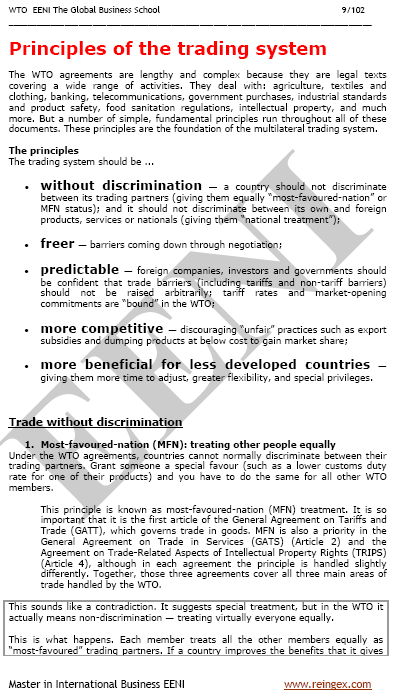


The Subject “World Trade Organization” belongs to the following Online Programs taught by EENI Global Business School:
Masters: International Business, Foreign Trade.
Languages:  or
or  Organization mondiale du commerce (OMC)
Organization mondiale du commerce (OMC)  Organización Mundial del Comercio (OMC).
Organización Mundial del Comercio (OMC).
Area of Knowledge: Globalization.

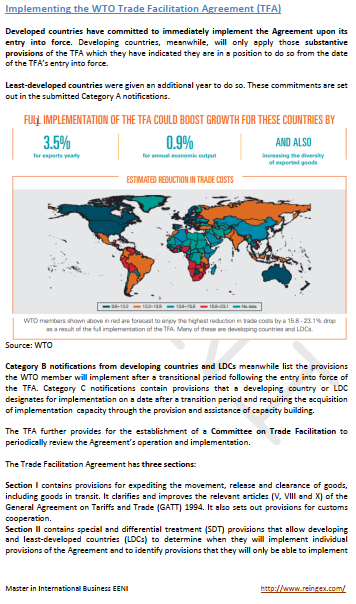
World Trade Organization
In 1995 was created the WTO replacing the General Agreement on Tariffs and Trade (GATT) (Created in 1948).
- The World Trade Organization is the sole global body that regulates the International trade in Goods and Services between 157 nations
- The main objective of the WTO is to facilitate the international trade in goods and services between the exporters and importers
- International Trade tariff rates and open markets engagement are “bound” in the WTO
- The negotiated agreements at the WTO by the member countries should be ratified in their parliaments
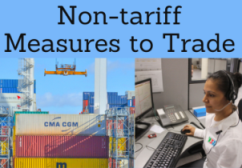
The World Trade Organization defines the principles of the Foreign Trade System:
- Without discrimination: a nation should not differentiate between its trade partners (“most-favoured-nation” or MFN status), and it should not show favoritism between national and foreign products or services (“national treatment”)
- International Trade - More free: foreign trade barriers should be reduced or eliminated by negotiation
- International Trade - predictable: all the actors involved in International Trade (foreign companies, investors, and governments) should be convinced that foreign trade barriers (tariffs and non-tariff barriers) should not be elevated capriciously
- International Trade - more competitive: daunting “unfair” practices (export subsidies, dumping)
- International Trade - more profitable for Less Developed Countries

The General Agreement on International Trade in Services (GATS) is the sole ensemble of regulations ruling International Trade in Services.
- Technical Barriers to Trade
- Non-automatic Import licensing, quotas and prohibitions
- Sanitary and Phytosanitary Measures
- Safeguards
- Preshipment Inspection
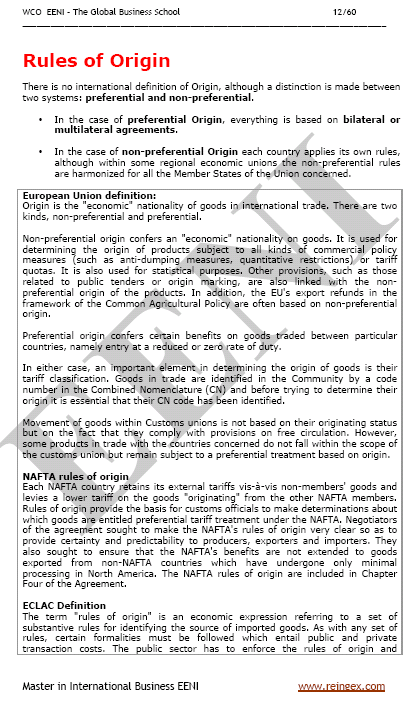
The General Agreement on International Trade in Services was negotiated at the Uruguay Round (1986-94) with the objective of regulating the immense international trade in services growth.
The International Trade in Services stand for the fastest growing sector of the global economy:
- 60% of global production
- 30% of global employment
- 20% of the global trade
The World Trade Organization Agreement on International Trade-Related Aspects of Intellectual Property Rights (TRIPS) was also negotiated at the Uruguay Round, introducing intellectual property regulations.
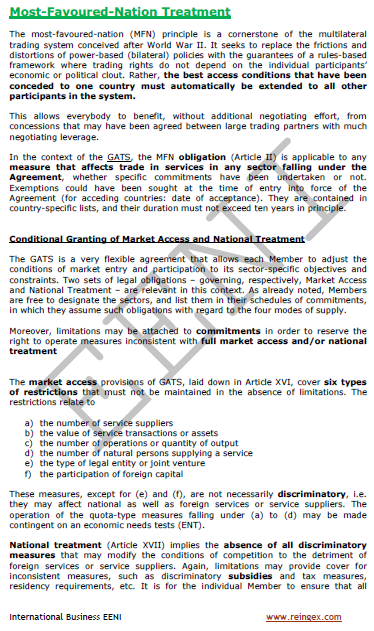
The World Trade Organization member states: Albania, Angola, Antigua and Barbuda, Argentina, Armenia, Australia, Austria, Bahrain, Bangladesh, Barbados, Belgium, Belize, Benin, Bolivia, Botswana, Brazil, Brunei, Bulgaria, Burkina Faso, Burundi, Cambodia, Cameroon, Canada, Cape Verde, Central African Republic, Chad, Chile, China, Colombia, Costa Rica, Croatia, Cuba, Cyprus, Czech Republic, DR Congo, Denmark, Djibouti, Dominica, Dominican Republic, Ecuador, Egypt, El Salvador, Estonia, Eswatini, the EU, Fiji, Finland, France, Gabon, Gambia, Georgia, Germany, Ghana, Greece, Grenada, Guatemala, Guinea, Guinea-Bissau, Guyana, Haiti, Honduras, Hong Kong, Hungary, Iceland, India, Indonesia, Ireland, Israel, Italy, Ivory Coast, Jamaica, Japan, Jordan, Kazakhstan, Kenya, Kuwait, Kyrgyz Republic, Laos, Latvia, Lesotho, Liberia, Liechtenstein, Lithuania, Luxembourg, Macau, Macedonia, Madagascar, Malawi, Malaysia, Maldives, Mali, Malta, Mauritania, Mauritius, Mexico, Moldova, Mongolia, Montenegro, Morocco, Mozambique, Myanmar, Namibia, Nepal, Netherlands, New Zealand, Nicaragua, Niger, Nigeria, Norway, Oman, Pakistan, Panama, Papua New Guinea, Paraguay, Peru, Philippines, Poland, Portugal, Qatar, Republic of the Congo, Russia, Romania, Rwanda, Saint Kitts and Nevis, Saint Lucia, Saint Vincent and the Grenadines, Samoa, Saudi Arabia, Seychelles, Senegal, Sierra Leone, Singapore, Slovakia, Slovenia, Solomon Islands, South Africa, South Korea, Spain, Sri Lanka, Suriname, Sweden, Switzerland, Taiwan, Tanzania, Tajikistan, Thailand, Togo, Tonga, Trinidad and Tobago, Tunisia, Turkey, Uganda, Ukraine, UAE, UK, the U.S., Uruguay, Vanuatu, Venezuela, Vietnam, Zambia, Zimbabwe.
Countries in process of accession to the WTO: Afghanistan, Algeria, Andorra, Azerbaijan, Bahamas, Belarus, Bhutan, Bosnia and Herzegovina, Comoros, Curacao, Ethiopia, Equatorial Guinea, Holy See (Vatican), Iran, Iraq, Lebanon, Libya, Uzbekistan, Syria, São Tomé, Serbia, Somalia, Sudan, South Sudan, East Timor, Yemen.
Governments with observer status: Algeria, Andorra, Azerbaijan, Bahamas, Belarus, Bhutan, Bosnia and Herzegovina, Comoros, Curacao, Ethiopia, Equatorial Guinea, Iran, Iraq, Libya, Uzbekistan, Syrian Arab Republic, Lebanese Republic, Holy See, Sao Tome and Principe, Serbia, Somalia, Sudan, South Sudan, East Timor, Turkmenistan.
Non-member country: North Korea.
